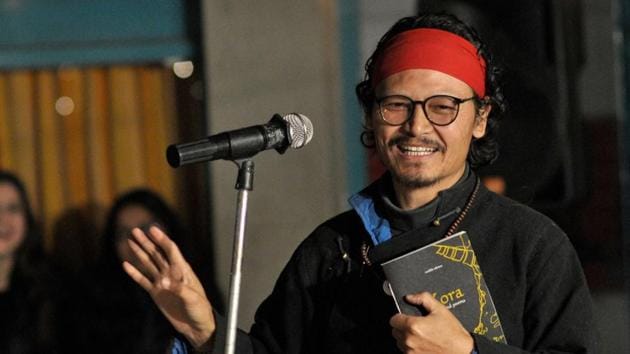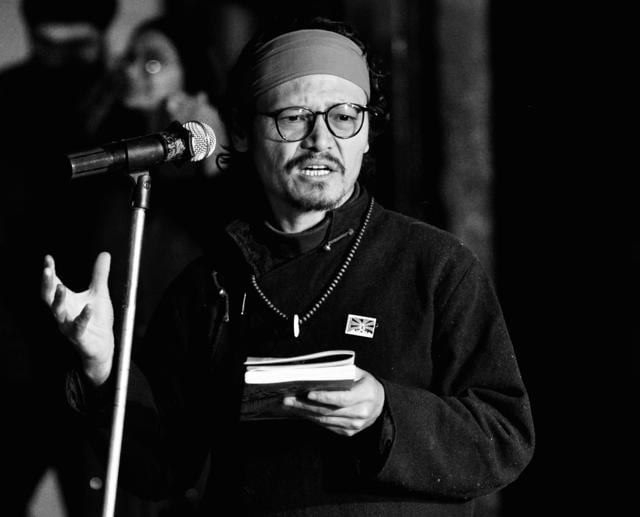By the way: When Tibet comes to Chandigarh, and freedom follows
Four nights, five days, before he was caught by the Chinese and sent back after three months in a jail there. “I think they found out that I was no warrior. I was harmless, they must have thought.”
He sits ramrod straight, next to the fire. He stares right at the platform under the tree, where poets and other writers are reciting and reading. A red scarf appears to keep his head intact, his emotions in check, and his gaze constant. And he holds a book that he disappears into, in between, as others perform.

Tenzin Tsundue sits still. Tenzin Tsundue floats. I sit behind him, reading to myself from his book ‘Kora’:
‘When I was born
my mother said
you are a refugee.’
We are at a bonfire event in Chandigarh, where he is the centrepiece, not only for being a poet, but for being the most romantic of the heroes of our times – a Tibetan freedom fighter.
Except that he does not fight. He lives. “As does Tibet,” he tells me later at a dhaba, tapping the end of his index finger on the side of his head. Tibet is alive, free, in there, he means to say. His red scarf is stark as ever, no wrinkles. This is almost end of the day, an hour or so before we head to Sector 17 for late-night chai, and he tells us — a set of four people who, to be honest, know Tibet only in the smiling monks walking the streets of McLeodganj or Dharamshala — how he crossed the border to his homeland at the turn of the millennium. Four nights, five days, before he was caught by the Chinese and sent back after three months in a jail there. “I think they found out that I was no warrior. I was harmless, they must have thought,” he chuckles.

Back at the event, he used wit as his weapon. A weapon to floor the audience with. A weapon whose powers not many understand.
To the audience of 150-odd, of whom hardly two were older than him, the 40-something activist poet began by re-describing the word ‘refugee’.
‘On your forehead
between your eyebrows
there is an R embossed
my teacher said.’
He said it was never a matter of shame or pity. “We kids thought the R made us special,” he smiled wide. The poem’s last lines say it too:
‘I have three tongues
the one that sings
is my mother tongue.
The R on my forehead
between my English and Hindi
the Tibetan tongues reads:
Rangzen’
The Tibetan word for freedom.
He regaled the audience with tales bittersweet, telling them of how he was born in a roadside tent among rocks, as his parents worked as road construction labourers in the treacherous Lahaul valley. And then he transported Chandigarh to his rented home in Little Lhasa as he read:
‘When it rains in
Dharamsala
raindrops wear boxing gloves,
thousands of them
come crashing down
and beat my room.
[…]
I sit on my island-nation bed
and watch my country in flood,
notes on freedom,
memoirs of my prison days,
letters from college friends…
[…]
A rented room for home
is a humbling existence.
My Kashmiri landlady
at eighty cannot return home.
We often compete for beauty
Kashmir or Tibet.’
At Nagpal Dhaba later, he eats one chapati and dal. “That’s enough for me,” he insists. And then taps on his inner strength to give long, patient answers to questions about his ideological differences with the Dalai Lama, about his family, about his mother, about Tibetan culture, about the meaning of words, about poets he likes. He quotes from ‘Obituary’ by AK Ramanujan in which the poet says about his father: ‘Being the burning type, he burned properly at the cremation’. “Poetry must have layers,” says Tenzin. But he reserves the layers for an answer to the most direct of questions: Don’t you ever get sick of it all? Do you really think Tibet will someday be free?
He breaks it down into small sentences: “I don’t keep thinking about the freedom of the land. I would go crazy. Our cause is what matters. And it matters to the world. Our struggle, our commitment to non-violence, the strength of our culture, our patience, and our compassion must stay alive. It’s more important than ever. Not just for Tibet. Not for freedom of a piece of land alone. Not for me alone,” he says. And then he taps the tip of his index finger on the side of his head.
Tenzin Tsundue sits still. Tenzin Tsundue floats.
The author can be contacted at aarishc@gmail.com
Follow author at @aarishc





